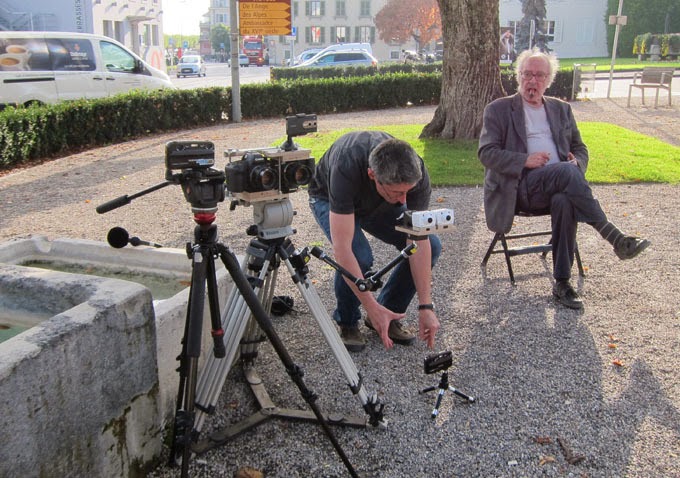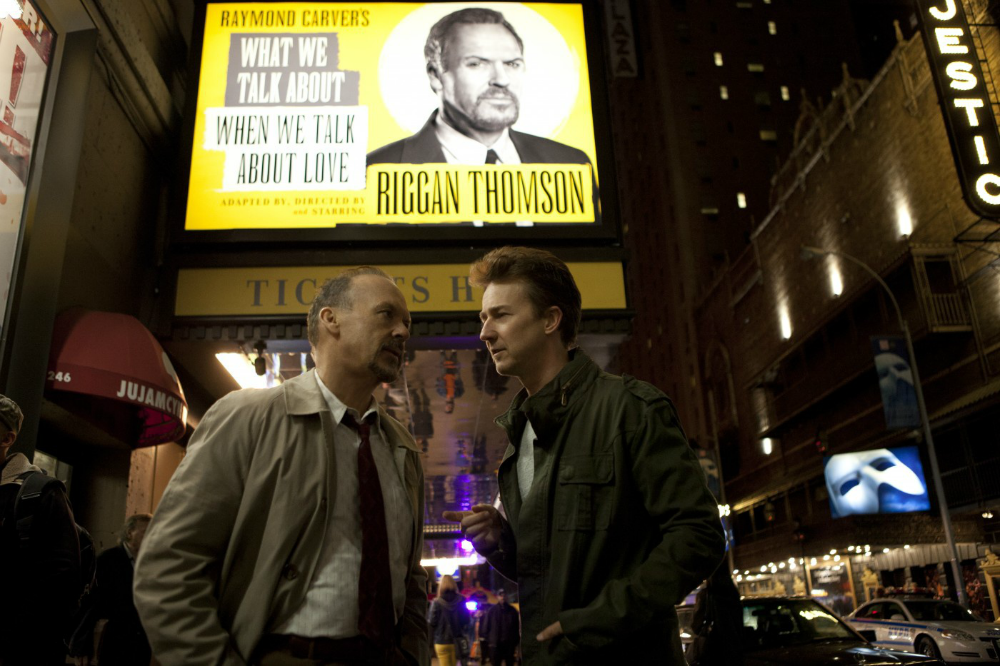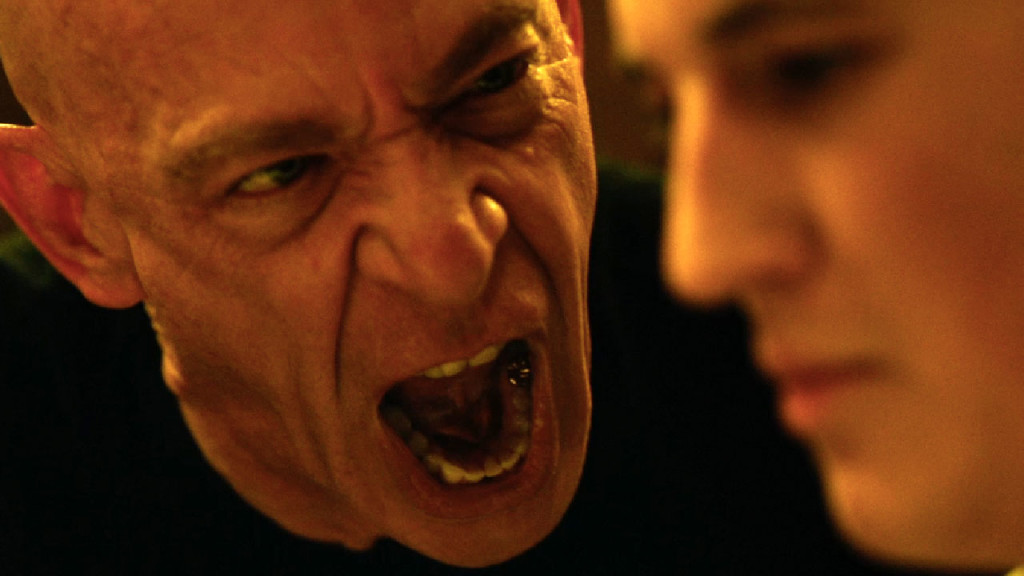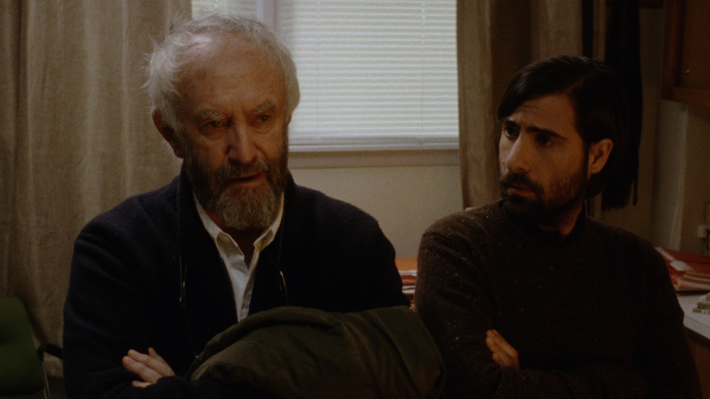Reviews include Irena’s Vow, The Beast, and Before I Change My Mind.
Books, Beats, and Birds: This Season’s “Honest” Characters
October 30, 2014
Whiplash, Birdman, and Listen Up Philip all share a common theme: characters who are brutally honest. Andrew Parker writes:
There’s a moment in Jean-Luc Godard’s 3D opus Goodbye to Language when an older man asks a younger man to tell him what he knows about philosophy. Before the younger man can answer, Godard abruptly cuts away to something else—almost impolitely so—in a manner that insinuates whatever the young man was about to say wouldn’t matter. It’s a moment of abject artistic honesty that functions as one of the film’s more meta-documentary elements, despite the film ultimately being a work of fiction.

The idea of artists openly dismissing ideas they disagree with isn’t new—certainly not for Godard, anyway—but there is something interesting about how film in 2014 has brought us several works that openly discuss the nature in which artists perceive harsh and brutal criticism. Unlike Godard’s decidedly less mainstream effort where broaching the idea of artistic honesty becomes an auteur statement, Damien Chazelle’s Whiplash, Alejandro González Iñárritu Birdman, and Alex Ross Perry’s Listen Up Philip make that conversation critical to the text.
Of these three films, only Birdman or (The Unexpected Ignorance of Virtue) suggests that sometimes honesty isn’t the best policy. Michael Keaton’s Riggan Thomson isn’t just an ex-superhero box office star trying to mount his first Broadway stage production in the form of a thematically suspect Raymond Carver adaptation—he’s a broken man who refuses to be honest about his shortcomings as peers and colleagues refuse to enable him.
During Riggan’s first disastrous preview, method actor Mike Shiner (Edward Norton) becomes disgusted by Riggan’s directorial decision to swap out his on-stage persona’s very real bottle of gin for a mickey filled with tap water. Enraged by this transgression towards how he conducts his art, Shiner brings the show to a screeching halt with a fourth wall-breaking tirade that the patrons in the theatre clearly weren’t expecting. It seems like an act of ego and grandstanding, but it’s also an uncomfortable moment of honesty delivered by a character the viewer isn’t necessarily supposed to be siding with.
The honesty doesn’t end with the aborted performance, leading to Riggan demanding to go on a walk for a cup of coffee with Mike following the show. Quickly trying to assert his dominance over his hired actor in the way that only a novice director and a once-coddled actor could, Riggan asks Mike in a harsh tone if there was every anything he did to disrespect him as an actor. Mike remains unflappable, almost cool; he puffs on a cigarette walking with Riggan amicably, never antagonizing, but also never looking his director in the eye. When Riggan angrily states that he has a lot riding on the success of the show, the half-in-the-bag Shiner throws it back in his face. Through a flurry of drunken, mixed metaphors, Mike reminds Riggan that his status as a superstar has left him financially stable, capable of failure, and able to return to franchise films without much trouble. Mike lays bare something that Riggan hadn’t previously thought about: that a stage production of anything is bigger than simply which name is at the top of the marquee. He has no shelter here from critics or people who think he’s a fraudulent director; this isn’t a Hollywood backlot. Mike further notes that long after Riggan “fucks off” back to Hollywood, he’ll still be in New York doing what he loves.

It’s a sequence that’s meant to dovetail later with a scene that features Riggan going back to the bar where the duo originally went for “coffee.” There, he attempts to charm a contentious, acerbic, erudite, and admittedly unfair New York Times theatre critic (Lindsay Duncan) by buying her a drink and sheepishly trying to explain himself before she sees the show. She’s having none of it, refusing the drink and honestly stating that she thinks what Riggan’s doing is everything that’s wrong with actors trying to make the jump from screen to stage. Although her honesty about going into Thomson’s show with the intention of panning everything about it smacks of resentment and pettiness (aside: it’s refreshing to hear a critic confess to negative expectations), these are the kinds of things Riggan will need to hear as an artist if he wants to grow beyond the point he’s at. It’s the kind of honesty that only a change in careers can bring, and the people around him are cast doubt on theatre being an artistic medium he genuinely wants to explore—or if he’s only doing it for a selfish form of recognition he hasn’t achieved yet.
But the concept of honesty and criticism in art gets cloudier—and rowdier—in the abusive and reckless teacher/student relationship at the heart of Whiplash. Wanting nothing less than to be the best jazz drummer in the world, Andrew Neiman (Miles Teller) travels to one of New York’s most prestigious music conservatories and finds himself studying under the sarcastic, abrasive, and hostile tutelage of Terence Fletcher (J.K. Simmons). Fletcher tests his students—particularly the ones trying vying for the main drumming position—by leading them to the point of tears and terror, keeping them there, and seeing how long they last before they snap. Through a blend of psychological torture and physical abuse, Fletcher conditions his students with what he thinks to be the right thing: brutal and honest trials to see who can withstand the pressure, and only the greatest musicians will.
Neiman understands his errors inside the band’s practice room, pushing himself to meet Fletcher’s seemingly unattainable levels of perfection. Indeed, he doubles-down—making hasty, unsafe decisions that affect his mental and physical health to continue his ascendance. And it’s here that Fletcher comes across as a character representative of the outside world: he’s every loathsome, know-it-all cretin who believes he’s unlocked the secret to musical perfection. He’s the harshest critic whose form of honesty comes not only from years of musical knowledge at his disposal, but from the same place an actor like Mike Shiner gets his courage from: as abhorrent as his process is, Fletcher takes what he knows to be true and honest and delivers those tidbits of knowledge in ways that he knows will have the most impact (sometimes in the form of a slap).
-

Fletcher is relentless.
Whiplash orbits Fletcher in a conjunctive relationship with Neiman, but Listen Up Philip features its brutally-honest character as the perpetual centre of the story. Author Philip Louis Friedman (Jason Schwartzman) has only recently turned thirty yet already has one literary masterpiece to his name; the second is on the way. The audience doesn’t know too much about Philip’s life before these milestones in his life, but it’s evident that Philip not only believes strenuously in the power of honesty—once again, even if it hurts or offends those around him—but that he finds dishonesty in any form as the most unforgivable of sins.
In the first act alone, Philip cuts down an ex-girlfriend, a potential groupie, a former best friend, a fellow writer and journalist, and his current girlfriend (Elisabeth Moss) for various perceived slights against his art. Philip has reached a point in his career that Mike Shiner and Terence Fletcher probably reached a long time ago: that period of their trajectory where they have begun to cut people out of their lives that haven’t been honest with them. In one scene, Philip remarks during a dreadfully dull mixer that he just wants one person to come up and shoot straight with him, even if it means being callous or aggressively mean.
In this respect, Philip’s honesty will lead to him having the most tragic arc in any of the three films mentioned. Although Perry’s script allows for no epiphanies and ultimately Philip can only transcend his priggishness by becoming—at best—a tolerable person, it’s clear from the opening moments that Philip only treats others exactly the way he wishes to be treated. His tone isn’t sarcastic, making his unfiltered thoughts sound a lot more brutal, but he’s also never saying things just to get a rise or reaction out of people. In this respect he’s as selfish and self-centred as Shiner or Fletcher, but Perry’s film becomes about how a strenuously blunt artist deals with having his trust betrayed by the one person he believes to be on the same philosophical and ideological level of integrity.

That figure comes in the form of Ike Zimmerman (Jonathan Pryce), an established author several decades Philip’s senior that takes the young man under his wing. Ike offers Philip a place in the country to stay to escape the noisy distractions of New York City and a job teaching at a prestigious small town university so Philip doesn’t have to make nice with the press to promote his latest novel. Philip sees a kindred spirit in Ike; someone who values honesty as much as he does.
In reality, Ike only sees Philip as a pawn in a ploy to appear more relevant. Ike hasn’t been a success in years, but he still carries himself like he’s the most important person in the room. It’s an insidious psychological ploy that only becomes known in the film’s most bravura sequence where Ike calls Philip in the middle of the night to help him woo a pair of older women into bed with him. In a fit of desperation, he summons his younger, (arguably) more charming counterpart to the scene, and when Philip becomes visibly uncomfortable at the situation, Ike berates Philip for not being more charming.
Films like these show how charm becomes an agent of destruction, capable of neutering the most honest of artists. To Perry and Schwartzman’s credit as writer and performer, respectively, Philip never changes his stance on the importance of honesty. The incident doesn’t lead to as bombastic of a comeuppance as those that happen in Whiplash or Birdman, but rather a single scene with a single line of dialogue that sums up Philip’s betrayed and hurt feelings quite succinctly (“I’m not sitting in the pupil’s chair in my own office”). Philip has said a lot of hurtful things to a lot of innocent people, but he, like all of us, doesn’t deserve to be lied to.
It’s also worth noting that all three films are very entrenched in the New York City arts scene. Long ago when Frank Sinatra sang “If I can make it there, I’ll make it anywhere,” he was being honest with people. The city’s reputation as a burg that will eat people alive if they can’t make the minimal artistic and financial cut-off points becomes a chilling reality in all three films, despite the fact that only Perry’s film flips things around to make the taken-advantage-of protagonist the person who was born there and still learning. It has long been a joke that New York plays a character in films far too often, but Whiplash and Listen Up Philip never use the city’s reputation as a crutch. Birdman certainly makes New York and its almost incestuous theatre scene into an implied character, but Chazelle and Perry are merely showcasing the kind of temperament the city can breed in its most successful of prodigal sons.
Finally: who is Jean-Luc Godard if not a mentor who has been brutally honest with us? His lesson is that honesty isn’t only the best policy, but a highly malleable philosophy. The above titles—and Goodbye to Language—all call into question what we as viewers are willing to accept as honest advice and criticism. Characters in these films thrive on and seek honest truths, but do they necessarily have the strength to face them? More importantly, will viewers learn anything about the nature of brutal honesty by watching the films? It’s certainly something worth thinking about and considering that people constantly challenge the definition of honesty to fit their own moods and feelings of societal decorum, and all four films certainly provoke challenging reactions on the subject that will change depending on whomever views them.



